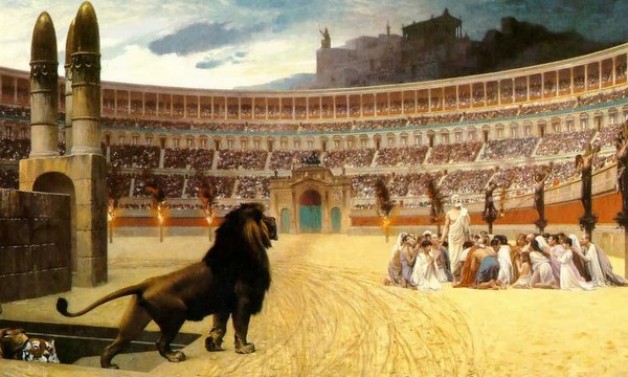It is the mark of the epic hero to stare courageously into the face of his foul foe who is bent on death and destruction; the hero is bold even when obviously outmatched. This is also the mark of the saint, but here the enemy’s gnashing teeth are generally spiritual rather than physical and the source of the saint’s mettle is found in Someone other than himself. Confronted with such a beast, it is the mark of our culture to flee, or worse, to refuse to acknowledge the adversary’s existence, or even worse, to call the evil good and enable its devastation.
To be sure, there is some wisdom to be found in fleeing from evil. There is, however, no wisdom whatsoever to be found in befriending it, and this is precisely what our culture has done these last forty years with abortion. Not surprisingly, this foe has left in its turn a “deep wound in society,” to borrow the words of Pope Benedict XVI. It is almost as if the Psalmist had modern America and the four decades since Roe v. Wade in mind when he wrote:
For forty years I wearied of that generation,
and I said, “Their hearts are astray;
this people does not know my ways.” (Ps 95:10)
We are left hoping that the fate of those about whom these lines were originally written, the unfaithful desert-wandering Israelites, will not be our own: their infidelity turned their hearts to such hard stone that they refused to listen to the voice of the Lord, and as a result that generation did not enter into his rest, into the Promised Land.
Thankfully, the true and final Promised Land still lies ahead, and our entry has not been forbidden. But the unmistakable connection between the Israelites’ hardness of heart in the desert of Sinai and our own culture’s hardness of heart in the desert of amoralism, apathy, and relativism is at the very least distressing.
One might here object that we will not be judged as members of a culture but as individuals—the conclusion being that as long as one lives well in his own personal life, he will be just fine: the “yes-abortion-is-wrong-but-it-doesn’t-concern-me-directly” argument. It is true that we will not be judged as members of a culture; we will, however, be judged as members of the Body of Christ, and “if one member suffers, all suffer together” (1 Cor 12:26)—that is, the suffering effected by the wound from which our culture has suffered these last forty years affects us all, and the responsibility of righting this wrong belongs to all.
Recognizing this responsibility, and seeing the severity of the wound, the pro-life movement has been asking since the moment the enemy’s biting blade broke the skin on this day in 1973: Now what do we do? How can we effectively fight back? Turning and running from the reality of abortion is obviously useless, pretending it isn’t such a big deal is foolish, and befriending it is perilous. This very friendship has been the backdrop of 55 million tragic deaths. Unlike the epic hero, we are incapable of overcoming this diabolical enemy by our own unaided powers. The only option that remains is the strategy of the saint. The saint does not rely on his own unaided powers. The saint relies on grace, and this is precisely what makes him saintly.
It is easy to speak of abortion as a very sad thing, to gasp at the mind-boggling statistics, and to feel pity for the expectant mothers who feel trapped and see abortion as the only way out. These reactions, however, right though they are, will not solve the problem. No, our most powerful weapon in this and every spiritual war—and make no mistake, this is a spiritual war—is the one that is often forgotten: prayer.
In the battle against such an overwhelmingly large problem and its causes, progress may be slow, and when we do not immediately see the effects of our prayers, discouragement may set in—but we must not lose heart, because Christ has overcome the world (Jn 16:33), and we, by our faith, participate in his victory:
This is the victory that overcomes the world, our faith. Who is it that overcomes the world but he who believes that Jesus is the Son of God? . . . This is the confidence we have in him, that if we ask anything according to his will he hears us. And if we know that he hears us in whatever we ask, we know that we have obtained the requests made of him. (1 Jn 5:4-5, 14-15)
So as we mourn over the unfathomable loss of life caused by abortion these last forty years, let us pray that our country and our culture be awakened to the damage being done, that expectant mothers be strengthened to choose the path of love and life, that the wounds of abortion be healed, and that the evil of abortion be eradicated. Let us “ask in faith, with no doubting” (Jas 1:6)—and let us trust in the Lord, who is “gloriously triumphant” (Ex 15:1).
✠
Image: Jean-Léon Gérôme, The Christian Martyrs’ Last Prayer







